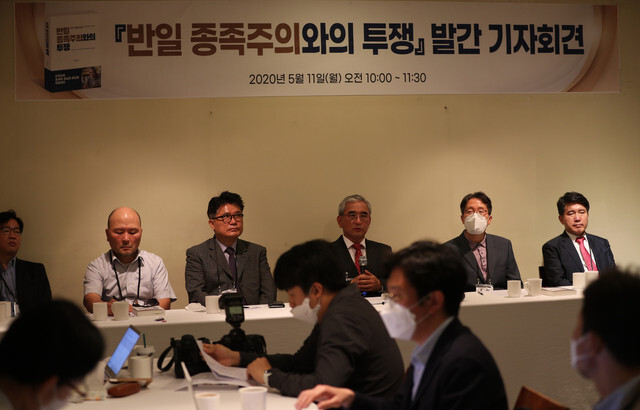hankyoreh
Links to other country sites 다른 나라 사이트 링크
[Editorial] The far right’s efforts to thwart the comfort women movement are unacceptable

The authors of the overtly pro-Japanese history book “Anti-Japan Tribalism” have published what amounts to a “sequel” in which they reiterate their claims that work as a Japanese military comfort woman was a “high-reward.” This is a second form of victimization that inflicts an additional insult on the survivors.
Released on May 11, the book “The Battle with Anti-Japan Tribalism” is the work of Lee Young-hoon, former professor at Seoul National University, and other pro-Japanese scholars and media figures. As in last year’s book “Anti-Japan Tribalism,” they once again distort history by selectively highlighting or exaggerating statistics and memoirs in connection with the comfort women issue, forced labor mobilization, and the Dokdo islets.
Lee claimed that Japanese military comfort stations represented a “high-labor, high-reward, high-risk market in comparison with the licensed prostitution practiced on the home front.” He argued that it was “impossible that all of the comfort women were victims of crimes of seizure and abduction” and that “some them were women who had already been working in the sex industry.” He also used movie scenes showing armed Japanese soldiers dragging victims off as a focus of criticism in denying the women’s forcible mobilization, a subject most scholars stopped debating a long time ago.
Drawing on the language of feminism, he argues that the comfort women survivors were victims of poverty and a patriarchal system, while concealing the roles of the Japanese government and military in mobilizing the women and operating the comfort stations.
Also noteworthy is how much more clearly they revealed the political aims of their distortions compared with last year. In his foreword, Lee describes the Moon Jae-in administration as “anti-Japanese tribalists and pro-Chinese sycophants.” At the end of the book, he blasts a South Korean Supreme Court ruling ordering compensation for forced labor mobilization, describing the accounts of survivors as a “parade of lies.” For their publication date, the authors chose May 16, the day the Park Chung-hee administration came to power in a military coup; as an appendix, they’ve released a pamphlet lauding the achievements of former President Rhee Syng-man.
It’s clear what their aims are: to rally the pro-Japanese constituency on the far right and frustrate the Moon administration’s efforts to resolve the comfort women and forced labor mobilization issues.
In its Japanese translation, the book is being welcomed by the far right in Japan. It’s a case of South Korean and Japanese right-wingers joining forces across the sea to propagate historical distortions, with the comfort women issue as the chief battlefield. Even after their great suffering at the hands of the Japanese military, the comfort women survivors were forced into silence during the following era of military dictatorships; it was only in 1991, with the testimony of the late Kim Hak-sun, that they began joining countless activists and members of the public in sharing the truth with the world.
These efforts have broadened into the international community as a whole, transforming into a movement of human rights in solidarity with women around the world who are suffering as a result of wartime sexual violence. Yet right-wingers in South Korea and Japan continue unabated in their provocations as they try to thwart the achievements of a comfort women rights campaign that has lasted for 30 years. This is simply unacceptable.
Please direct comments or questions to [english@hani.co.kr]

Editorial・opinion
![[Column] Welcome to the president’s pity party [Column] Welcome to the president’s pity party](https://flexible.img.hani.co.kr/flexible/normal/500/300/imgdb/original/2024/0515/3917157400447943.jpg) [Column] Welcome to the president’s pity party
[Column] Welcome to the president’s pity party![[Editorial] Korea must respond firmly to Japan’s attempt to usurp Line [Editorial] Korea must respond firmly to Japan’s attempt to usurp Line](https://flexible.img.hani.co.kr/flexible/normal/500/300/imgdb/original/2024/0514/2317156736305813.jpg) [Editorial] Korea must respond firmly to Japan’s attempt to usurp Line
[Editorial] Korea must respond firmly to Japan’s attempt to usurp Line- [Editorial] Transfers of prosecutors investigating Korea’s first lady send chilling message
- [Column] Will Seoul’s ties with Moscow really recover on their own?
- [Column] Samsung’s ‘lost decade’ and Lee Jae-yong’s mismatched chopsticks
- [Correspondent’s column] The real reason the US is worried about Chinese ‘overcapacity’
- [Editorial] Yoon’s gesture at communication only highlights his reluctance to change
- [Editorial] Perilous stakes of Trump’s rhetoric around US troop pullout from Korea
- [Guest essay] Preventing Korean Peninsula from becoming front line of new cold war
- [Column] The state is back — but is it in business?
Most viewed articles
- 1[Editorial] Korea must respond firmly to Japan’s attempt to usurp Line
- 2[Editorial] Transfers of prosecutors investigating Korea’s first lady send chilling message
- 3[Column] Welcome to the president’s pity party
- 4Second suspect nabbed for gruesome murder of Korean in Thailand, 1 remains at large
- 5Could Korea’s Naver lose control of Line to Japan?
- 6Major personnel shuffle reassigns prosecutors leading investigations into Korea’s first lady
- 7Naver’s union calls for action from government over possible Japanese buyout of Line
- 8Unexpected rate of AI development requires timely discussion of side effects
- 9US has always pulled troops from Korea unilaterally — is Yoon prepared for it to happen again?
- 10China gains 2 new ambassadors to Korea in form of newborn panda cubs